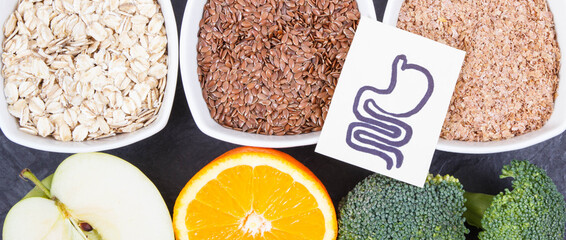Digestive problems include any gastrointestinal disorders that occur in the digestive tract, which is also called the gastrointestinal tract (GI tract).

What are the symptoms of gastrointestinal and digestive problems?
The most common symptoms of gastrointestinal and digestive disorders include: bleeding, bloating, constipation, diarrhea, heartburn, pain, nausea and vomiting. Accurate diagnosis of digestive disorders includes collecting a thorough medical history and conducting a physical examination of the patient.
Heartburn or gastroesophageal reflux disease is a chronic disease of the upper gastrointestinal tract in which the contents of the stomach are constantly and regularly thrown into the esophagus, which leads to symptoms and/or complications. Heartburn can worsen if a person lies down or bends over. The condition can also worsen after a person has eaten.
Celiac disease or cereal protein intolerance is a long—term autoimmune disease affecting primarily the small intestine, in which people develop intolerance to gluten present in foods such as wheat, rye and barley. Celiac disease is one of the most common digestive disorders, affecting about 1 in 133 people.
Diarrhea, also called loose stools, is a condition in which there are at least three very mild, liquid or watery bowel movements per day. This often lasts for several days and can lead to dehydration due to fluid loss. Diarrhea can be very difficult to treat because it can have so many possible causes. This may be the result of the body's inability to digest food — as in celiac disease.
Gastroenteritis, also known as infectious diarrhea or simply gastroenteritis, is an inflammation of the gastrointestinal tract, including the stomach and intestines. Symptoms may include diarrhea, vomiting, and abdominal pain. Fever, lack of energy, and dehydration may also occur. This usually lasts less than two weeks. Gastroenteritis is caused by an infection — viral or bacterial — in the intestine. Bacterial infections can be caused by E. coli or salmonella.
Excessive bacterial growth in the small intestine (IBD) is a common disorder of the gastrointestinal tract (GI tract). Bacterial overgrowth in the small intestine, also called bacterial overgrowth or bacterial overgrowth syndrome in the small intestine, is a disease associated with the overgrowth of bacteria in the small intestine. Unlike the colon, which is rich in bacteria, the small intestine usually contains less than 100,000 microorganisms per mm.
Ulcerative colitis (UC) is the first of two types of inflammatory bowel disease, the second type is Crohn's disease. This is a long-term disease that leads to inflammation and ulcers of the colon and rectum. The primary symptoms of an active disease are abdominal pain and diarrhea with an admixture of blood.
Constipation is an intestinal dysfunction that causes stools to become sparse or difficult. The stool is often hard and dry. Other symptoms of constipation may include abdominal pain, bloating, and a feeling as if the stool has not completely run out.
Diverticulitis, also called diverticulitis of the colon, is a gastrointestinal disease characterized by inflammation of abnormal sacs (diverticula) that can develop in the wall of the colon. Symptoms usually include sudden pain in the lower abdomen, but it can also occur for several days.
Allergic reactions to food or food intolerance. If a person has a food intolerance, it is difficult for them to digest certain foods.
Peptic ulcer is a rupture of the inner lining of the stomach, the first part of the small intestine, and sometimes the lower part of the esophagus. An ulcer in the stomach is called a stomach ulcer, and in the first part of the intestine — a duodenal ulcer.
Liver diseases. The digestive system, consisting of the gastrointestinal tract (GI tract), liver, pancreas and gallbladder, helps the body digest food. Therefore, it is very important what condition your liver and gallbladder are in, are they healthy?
Irritable bowel syndrome (IBS) is a functional disorder of the gastrointestinal tract characterized by a group of symptoms that usually include: nausea, abdominal pain, bloating and changes in stool sequence, diarrhea. These symptoms can occur for a long time, sometimes for many years.
Hemorrhoids are swollen veins in the anus or lower part of the rectum that can be painful and itchy. Causes include chronic constipation, diarrhea, and tension during stools. About three quarters of people aged 45 and older suffer from hemorrhoids.
Bile stone disease. A gallstone is a stone formed in the gallbladder from precipitated bile components. The term cholelithiasis can refer to the presence of gallstones or to any disease caused by gallstones, and choledocholithiasis refers to the presence of migrated gallstones in the bile ducts. If gallstones block the ducts leading from the gallbladder to the intestines, they can cause severe pain in the upper right corner of the abdomen.
Gastritis is when the mucous membrane of the stomach is inflamed (irritated, swollen and reddened). This may occur as a short episode or may have a long duration. Symptoms may be absent, but when symptoms are clearly present, the most common is pain in the upper abdomen. Other possible symptoms are nausea and vomiting, bloating, loss of appetite and heartburn.
Is it normal to have digestive problems?
No, this is not normal and requires attention, diagnosis, observation and treatment. But most people don't like to talk about it directly. Digestive problems are more common than you might imagine. In fact, according to the National Institute of Diabetes, Digestive and Kidney Diseases (NIDDK), 60 to 70 million people suffer from some type of digestive disease.
Does stress affect digestion?
When the stress response is activated, digestion is suppressed, as the body can redirect its resources. The central nervous system stops digestion by slowing down the contractions of the digestive muscles and reducing the secretion necessary for digestion.

What causes serious digestive problems?
Here's what can cause serious digestive problems:
- Traveling or changing your daily routine.
- Too little physical activity and exercise.
- Taking certain medications such as antidepressants, antihistamines, iron supplements, and some painkillers (especially narcotic painkillers).
- Diseases including cancer, diabetes, irritable bowel syndrome and hypothyroidism.
What causes stomach problems?
Stomach problems can occur due to various factors, including: infections, inflammation, choosing a new diet, unhealthy lifestyle factors, taking medications or concomitant diseases.
What is an unhealthy gut?
Although we can't use one specific indicator of gut health, some signs that you have poor gut health include:
- symptoms of poor digestion such as: gas, bloating, constipation, diarrhea and heartburn.
- sleep disorders or fatigue.
- mood/emotional state – for example, severe stress, bad mood or anxiety.
Why is my digestion so slow?
The main culprits of slow and irregular digestion are processed foods high in salt and sugar, fatty/fried foods, dairy products, eating too much meat, spicy foods and excess caffeine.
What happens if digestion is disrupted?
What are the symptoms that occur when the body does not digest food properly? It manifests itself as a particularly striking symptom - abdominal pain. Abdominal pain, whether it's hard stools, loose stools, blockage of stools, or gases (flatulence), can be a major indicator of gastrointestinal problems.
How can I improve my gut health?
Processed foods as well as alcohol can also negatively affect gut health. Prebiotic and probiotic foods such as whole grains, onions, garlic, fermented foods, miso and yogurt nourish beneficial bacteria in the gut. A diet rich in fiber and prebiotics ensures the growth of beneficial bacteria.
What can I drink after a meal to improve digestion?
In fact, drinking water during or after a meal helps your body break down and process food (digestion). Water is vital for good health. Other beverages help break down food so that your body can absorb nutrients. Water also makes the stool softer, which helps prevent constipation.
Does the use of hot water reduce gas formation?
The theory is that hot water can also dissolve and disperse the food you eat. A 2016 study showed that warm water can have a beneficial effect on intestinal motility and gas excretion after surgery.
What foods cause increased gas formation?
Examples of products that usually cause flatulence are the following:
- dairy products – for example, regular milk, especially if lactose intolerance is present.
- dried fruits – raisins and prunes.
- fruits are apple, apricot, peach and pear.
- foods high in insoluble fiber, especially seeds and husks.
- legumes – beans, peas, chickpeas, mash, soybeans and nuts.
Which morning drink is best for improving your digestion?
Which drinks in the morning best help us for good digestion:
- Ginger tea.
- Lemongrass tea.
- Mint tea.
- Tea with fennel.
- Coffee.
- Water.
Which juice has the best effect on digestion?
The best juices for digestion:
- Lemon juice. Lemon is a very wonderful ingredient in itself, which brings many benefits and benefits to your body.
- Celery juice. Celery is a low—calorie, fiber-rich vegetable with a high water content.
- Pomegranate juice.
- Apple juice.
- Beetroot juice.
- Plum juice.
- Green mango juice.
- Cucumber juice.
What foods are probiotics?
Some fermented foods that naturally contain probiotics.
- Yogurt and kefir (on a dairy or non-dairy basis, such as soy, coconut and water).
- Sauerkraut, kimchi, pickles.
- Miso, tamari (soy).
- Tempeh or natto (soy).
- Sour cream, cottage cheese, aged cheese.
Which fruits have a lot of probiotics?
Which fruits are rich in probiotics?
- Bananas.
- Custard apples.
- Watermelon.
- Grapefruit.
- Almond.
What kills beneficial gut bacteria?
A "Western" diet high in fat and sugar and low in fiber can kill certain types of gut bacteria, making your microbiota less diverse. Limit the use of antibiotics, which can destroy both healthy bacteria and problematic bacteria.

What kind of food kills harmful bacteria in the stomach?
- Extra virgin olive oil, rapeseed oil, sunflower oil;
- Fatty fish: mackerel, salmon, tuna;
- Edible nuts: chia seeds, walnuts, almonds, sunflower seeds, etc.
The above products destroy HP bacteria, repair the gastric mucosa and reduce the risk of stomach ulcers.
Does a chicken egg cause gas?
Contrary to popular belief, chicken eggs do not cause gas in most of us. But they contain sulfur-saturated methionine. Therefore, if you do not want an unpleasant smell of gases, do not eat eggs along with farting-causing foods such as beans or fatty meat. If eggs cause bloating and nausea, you may have an intolerance to them or an allergy.
Does rice cause gases?
Most starches, including potatoes, corn, and wheat, release gases when broken down in the large intestine. Rice is the only starch that does not cause gas formation.
How to solve digestive problems?
That's what you should be aiming for.
- Consume fiber to prevent constipation.
- Drink plenty of fluids to improve digestion.
- Reduce your fat intake for gut health.
- Be careful with spices to avoid stomach problems.
- Beware of triggers of intestinal symptoms.
- Choose the right drinks to ease digestion.
- Go through the recovery procedures at the Regeneration Academy.
- Use probiotics.
Six foods that promote healthy digestion and help avoid common gastrointestinal symptoms.
- Whole grain products.
- White or brown rice.
- Greens.
- Lean protein.
- Fruits with a low fructose content.
- Avocado.
Are digestive problems being treated?
Many surgical procedures are performed on the digestive tract. These include procedures performed using endoscopy, laparoscopy, and open surgery. But organ transplantation without surgery can only be performed at the Academy of Regenerative Medicine on the liver, pancreas and small intestine and other organs. The ARM can also help cure various digestive problems.


